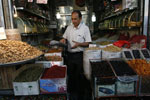 Bloomberg: The scarcity of shoppers at the food market near Hafez Street ahead of the March 20 start of the Nowruz holiday was a reminder to President Hassan Rouhani of the scale of Iran’s economic woes.
Bloomberg: The scarcity of shoppers at the food market near Hafez Street ahead of the March 20 start of the Nowruz holiday was a reminder to President Hassan Rouhani of the scale of Iran’s economic woes.
Bloomberg
By Golnar Motevalli and Ladane Nasseri

Fishmonger Shahin Anbarani’s counter was covered with bright-eyed Caspian kutum and spotted river trout, staples of the Persian New Year feast.
With few customers to serve, Anbarani spent much of what’s traditionally the busiest period of the year, when Iranians mark the beginning of spring, staring at a television fixed into a top corner of his shop in Tehran.
“This last month has been terrible, really bad,” he said, shaking his head. “People don’t have any money.”
The scarcity of shoppers at the food market near Hafez Street ahead of the March 20 start of the Nowruz holiday was a reminder to President Hassan Rouhani of the scale of Iran’s economic woes. While his nuclear diplomacy promises an end to sanctions that have sapped the oil-dependent economy, inflation near 40 percent and the imminent prospect of higher household bills are souring the mood.
“The atmosphere at home is terrible,” said Davoud Kashanian, an employee at Anbarani’s stall. “My wife can barely afford to buy a few grams of pistachios and dried fruit. At this time of year, you expect to see these in abundance on the table, but we’re struggling.”
After the latest round of talks ended last week in Vienna, negotiators for six world powers and Iran said they were hopeful a permanent nuclear accord could be reached before their temporary deal, which brought as much as $7 billion in sanctions relief, expires in July. Teams could begin drafting a final document by early May, Iranian Foreign Minister Mohammad Javad Zarif said.
Revenues Halved
Lifting remaining restrictions on commerce and financial transactions will be key to spurring growth beyond the 1 percent forecast for the next 12 months, according to the International Monetary Fund. Tighter sanctions, imposed over western concerns that the Islamic Republic is developing a nuclear bomb, have slashed oil revenues. Iran says its program is dedicated to producing electricity.
Iranians elected Rouhani in June after he pledged to end the nation’s economic isolation, slow price rises and create jobs. Since taking office two months later, he’s handed the central bank more autonomy, protected the institution’s funds from a housing program that could have siphoned off as much as $17 billion, and backed an increase in utility prices to cut spending by $21 billion.
While statistically inflation has edged lower, to an annual 38 percent, consumers haven’t noticed. Take-home pay for government workers is increasing at half that rate.
‘Main Driver’
“Purchasing power has fallen for everyone,” said Kevan Harris, a research associate at Princeton University’s Near Eastern Studies department. Even if there’s a deal with world powers, “oil exports probably won’t go up this year, so the government will be the main driver of the economy,” he said.
The government has to strike a “balance between pulling the reins to reduce inflation,” risking deepening the recession, and stimulating the economy, which could push up prices, Harris said.
Underscoring the nation’s financial crunch, Rouhani has asked Iranians to volunteer not to receive monthly cash payments of 455,000 rials ($18) that currently help most families. About 15 million people living below the poverty line were given food handouts last month, including rice imported from India and frozen chickens from Turkey.
The event became a public relations disaster that drove home the country’s levels of poverty as media showed long lines of Iranians braving freezing temperatures.
Who’s Happy?
Supreme Leader Ayatollah Ali Khamenei, cautioning Iranians that an end to sanctions isn’t around the corner and that recovery will take time, used his New Year speech to call again for an “economy of resistance” built around the twin pillars of reform and self-reliance.
Retailers had hoped optimism over Rouhani’s presidency would bring a better return after years of economic stagnation.
“We didn’t expect that with the new government the status of the economy and industries would improve immediately, it requires planning,” Mehdi Yekta, secretary of Iran’s Union of Clothing and Textile Manufacturers, said in a phone interview. “We foresaw problems but not to this extent.”
Late in the day, Anbarani served just his third customer of the day, a neatly-dressed pensioner in a green and gold silk headscarf, gold-rimmed spectacles and a black rain coat who wanted trout for her family.
“We’ll have a much smaller number of guests for New Year because I don’t have the budget,” said the woman, who declined to give her name to avoid reprisals from the government. “Mr. Rouhani says that people are satisfied. Where? Where are they happy?”


